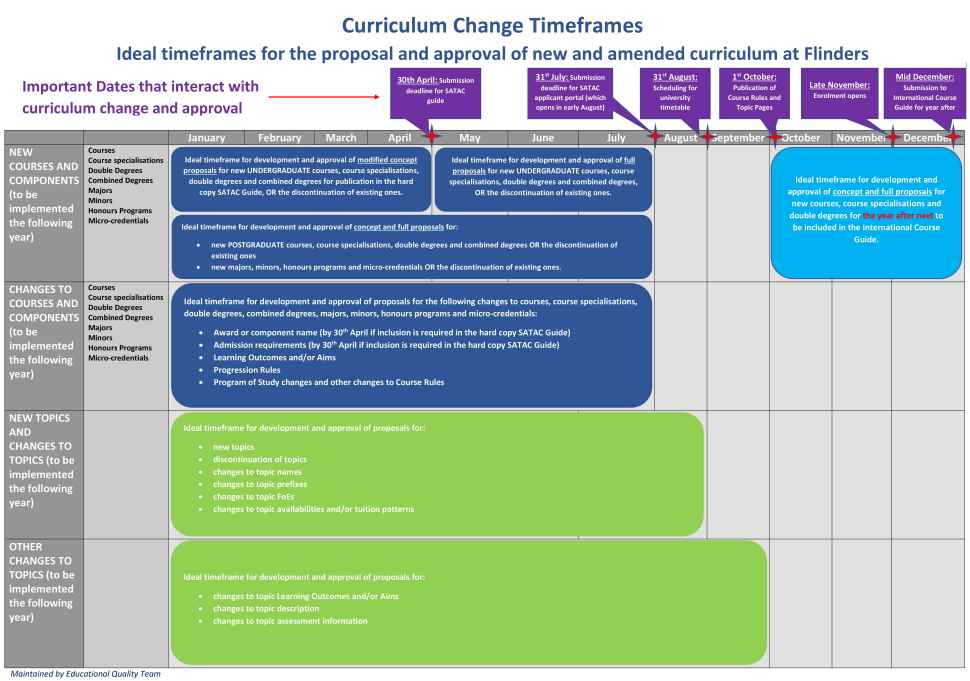Course and topic approval
The Educational Quality Framework recognises that educational quality is not an end goal but an ongoing pursuit.
Policies and resources to ensure the high quality of Flinders University curriculum and ongoing compliance with legislative and regulatory requirements.
Course and topic approval overview
The first step is to discuss your concept with your Teaching Program Director or Dean (Education).
When you are ready to seek approval for new, improved or discontinued curriculum, contact the Curriculum Services Team. They will work with you to clarify the scope of your proposal and confirm the approval level. They will initiate and populate the required online templates in CourseLoop for you to review prior to progressing through the approval workflow.
Frequently asked questions
CourseLoop is the university’s curriculum management system, providing a central repository for all governed course and topic data and approvals.
The Curriculum Services Team will support the development of your course and topic proposals, and progress for approval and implementation.
1. Discuss the proposed curriculum changes with your Teaching Program Director (TPD) and/or Dean (Education).
2. "Submit a ServiceOne request for the Curriculum Services team:
Access via the OKTA dashboard
* Navigate to Education > Curriculum Services OR search for Curriculum Services
* Submit request form.
Alternatively, if you’re logged into OKTA, this link will take you directly to the Curriculum Services request form.

Approving authorities (and associated approval processes) are based on the nature and complexity of the new course, specialisation, or component (major, minor, topic) and/or the changes proposed to these structures.
Approval authorities and their scope are clearly specified in Section 4 of the Award Courses Policy.
Approval times vary depending on the complexity of the proposed curriculum changes, the approval levels required and the timing of governance meetings.
Curriculum changes should be carefully planned to align with student recruitment, enrolment and government reporting deadlines. Coordinating changes with these deadlines, ensures ongoing compliance with university policies, regulatory and legislative requirements and optimises the student experience.
Establishing, changing or discontinuing courses, specialisations, majors, minors and topics has implications for many portfolios across the university. Seeking feedback from all relevant teams will increase the quality of the proposal, identify and address potential challenges and ultimately lead to a better student experience. Consultation is a vital part of the process and all teams endeavour to provide timely feedback.
You can review the progress of your curriculum change proposal in CourseLoop. The Curriculum Services team will collaborate with you during the development of the proposal to ensure all stakeholders are consulted and necessary inputs have been collected. When the proposal is complete and ready for approval, the Curriculum Services team will coordinate this process and liaise with the relevant approving authorities / committees as required.
When a proposal is approved, you will receive an automated email from CourseLoop that notifies you (and all relevant stakeholders) of the approval. The final proposal document can be viewed from the link provided in the email. If your proposal has been rejected, the Curriculum Services team will communicate the outcome and facilitate further changes.
A new topic must be offered within a course, course specialisation or course component. It serves little purpose as a separate entity. Therefore, if a new topic is being established it will only be approved if it is to be added to a course, course specialisation or course component.
Useful links
![]()
Sturt Rd, Bedford Park
South Australia 5042
CRICOS Provider: 00114A TEQSA Provider ID: PRV12097 TEQSA category: Australian University







